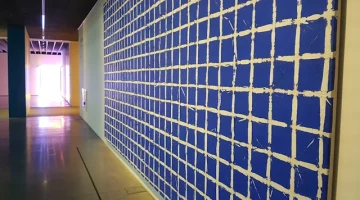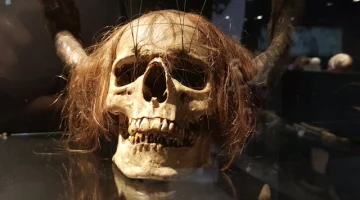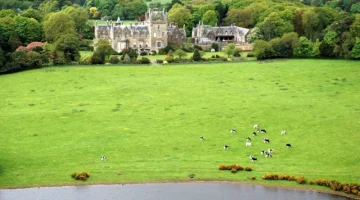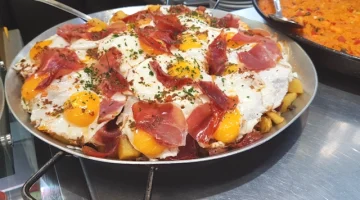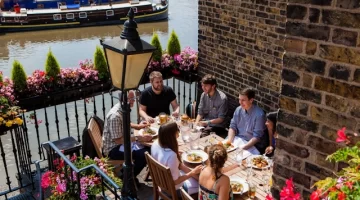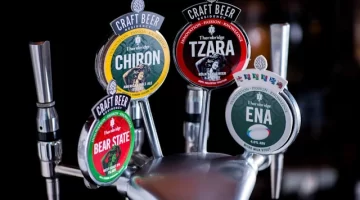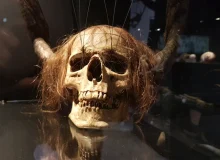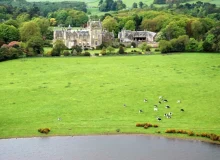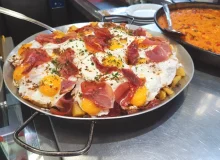Snakes Alive in Yangshuo
Visiting Yangshuo in China and sampling one of the local delicacies: snake.
Yangshuo
By Mike Gerrard
I wanted to eat the snake, but I drew the line at drinking its blood.
The Chinese might claim that it’s good for the virility, but I thought it would be even better for picking up a virus or a parasite. So the old lady in the kitchen, scarcely bigger than the snake herself, snipped its head off with a pair of scissors and deftly caught the blood in a cup for someone else to sample. The guts were removed and the skin came away with a sucking sound, as smoothly as a sheet of cling-film. It took about two minutes, and the snake was ready for the pot.
I’m in Susannah’s Cafe in Yangshuo, in Southern China’s Guangxi Province. In Yangshuo I could have gone cormorant fishing or been fixed up with a Chinese date, both of which I’d have got round to, given a few more days, but Yangshuo is a place for chilling out and cycling, not sight-seeing. The Lonely Planet Guide to China calls it ‘one of those legendary backpacker destinations that most travellers have heard about long before they even set foot in China.’
Yanghsuo is a tiny town that lines one bank of the Li River, famous for its cormorant fishermen and its rounded limestone hills. Tourists cruise the 85kms from the city of Guilin, marvel at formations with names like ‘The Yearning for Husband Rock’, buy the T-shirt in Yangshuo and bus back to Guilin in time for their sweet and sour supper. Few stay in Yangshuo because there are no 5-star hotels, so the back packers have moved in, mingling with independent Chinese travellers who can’t afford 5-star prices either, and turned it into a kind of Chinese Kathmandu.
Hang-outs with names like Susanna’s, Lisa’s and William’s Café, not to mention the inevitable Rainbow (tonight’s video, The Life of Brian) give a first impression of: hmm, nice place but not the real China (wherever that is.) But stay for a day or two and you’ll learn far more about the real China here, as barriers have been broken down, people are used to chatting to foreigners, and the tight-lipped legacy of the past is slipping.
Take the two young guys who were sitting on a bench gazing out across the Li River. ‘May we practice our English with you?’ It was a bit distracting, as in front of us a skinny man was skinny-dipping, taking a bath in the river and soaping his every nook and cranny. The two young students are also probing, asking my travelling companion if they speak English in Canada, and does every house in England have a swimming pool?
I smile at such naivete, then remember my own ignorance about life in China. I’d expected to see everyone still wearing Mao suits, and looking intensely serious, and instead found myself gazing at long-legged girls in their see-through skirts. I’d visited a Collective Farm, anticipating a lecture on the grain harvest but got a karaoke show instead, belting out Delilah from the village’s latest laser-disc system. China is changing, fast.
 ‘In fifteen years’ time,’ one of the students tells me, ‘China will be as strong in its economy as Japan. Chairman Mao is the past. He did many good things, but also made many mistakes.’ They want to know what my camera cost me, what my sandals are made of. ‘In China you can only get very poor quality shoes. They are no good after one month.’
‘In fifteen years’ time,’ one of the students tells me, ‘China will be as strong in its economy as Japan. Chairman Mao is the past. He did many good things, but also made many mistakes.’ They want to know what my camera cost me, what my sandals are made of. ‘In China you can only get very poor quality shoes. They are no good after one month.’
One guy is 18, his friend 24. They’re both studying English and want to be tour guides. The elder one tells me his father is a farmer in the countryside, and has to pay 4000 yuan a year (about £330) for his son’s education. Not much, you might think, but at the Collective Farm I’d learned that the average farmer’s annual income – and this on a prosperous farm – was only 3900 yuan. The boy’s course lasts three years. They hang round in Yangshuo in the summer because they’ve got no money. They don’t tell me this as a sob story, looking for a hand-out, just as a matter of fact. If I’d had the time and the cash I’d have hired them as fledgeling tour guides, but I’ve already made a date with a bike.
At the shop next to the Golden Leaf Hotel, they hire bikes for 5 yuan a day. For less than 50p you get a sturdy model and can join the rest of China’s population on two wheels. For a few pounds more you can hire a guide too, who’ll take you out into the farming villages around the town and show you Chinese peasant life modern style. Instead we take a ferry down-stream for an hour to a village called Fuli, past water buffalo wallowing in the river, and a little girl in pink, washing clothes. ‘Hello,’ she shouts across to the boat, waving. The banks are lined with weeping bamboos, trailing like feathers in the water. On the water are fishermen, and fisherwomen, sitting in flat-bottomed boats and wearing their coolie hats.
In Fuli people are sitting in their doorways making kites. As we cycle along the main street my back-brake starts catching on my wheel. No problem. In China you’re never further than about ten yards from a bicycle repair shop, and in two minutes and for another 50p it’s fixed. Two more minutes and we’re out in the country, biking past neat square paddy fields, a dazzling emerald green under a deep blue sky. Solitary figures are tending the rice.

It’s the archetypal Chinese landscape. Jagged limestone peaks swoop straight up from the ground for several hundred feet, whole rows of them like the jawbone of a Chinese dragon. The rocks are hidden beneath a green mossy growth of bushes and trees, enhancing the lushness of the land. Everyone waves and smiles, says ‘hello.’ If this is a repressed nation, wary of foreign devils, then they manage to hide it well.
Having worked up a sweat in the sunshine, getting back to Yangshuo we call in for a beer at the Olympic Café. And another. And another. You can soon blow a pound on three beers in Yangshuo. My laundry at the Golden Leaf Hotel costs me 10 yuan (80p) for one pair of trousers, a shirt, four t-shirts and three pairs of underpants. Even the underpants come back pressed.
The snake, however, was pricey. It cost 80 yuan (£7), served up in a stew with mushrooms and onions. It tasted like pork, but sweeter, only marred by the number of bones in it. It reminds our tour guide, Richard, of how he learned how to eat a frog. ‘I was in this restaurant and ordered some frogs, which I’ve never had before. I just fancied trying them.
When the plate came, I picked one up and started nibbling tentatively at it like you would a leg of chicken. The guy at the next table shook his head, leaned over, picked a frog off my plate, popped it in his mouth, chewed it for a minute then spat out the bones. “That,” he said, “is how you eat a frog.”‘
And that, too, is how to approach China. Don’t stay safely in the tourist hotels, but get out on the streets, talk to the people, eat in the local restaurants, visit places like Yansghuo as well as Beijing and Shanghai. Eat the snake. But whether you drink the cup of hot blood’s up to you.
The Imaginative Traveller.







